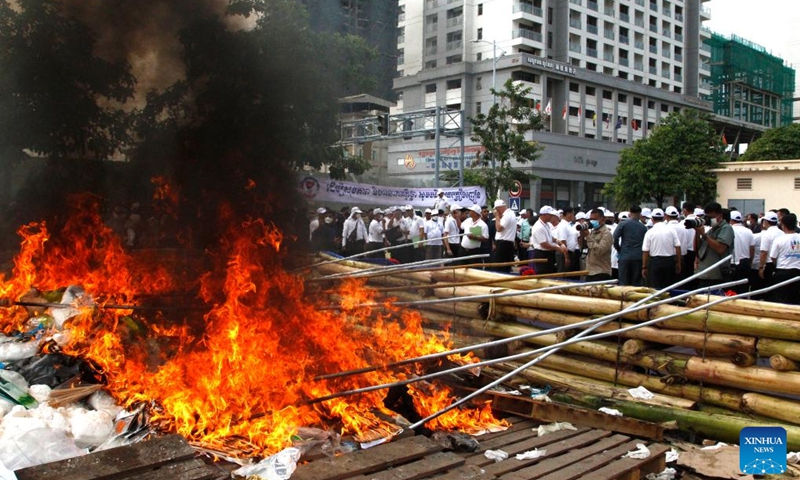
Illicit drugs and ingredients are burned down in Phnom Penh, Cambodia, June 28, 2023. Cambodia on Wednesday destroyed 5.71 tons of illicit drugs and ingredients, officials said. (Photo: Xinhua)
China announced on Wednesday that, in support of international drug control efforts, the Chinese government will increase its annual drug control donation to the United Nations Office on Drugs and Crime (UNODC) to $2 million starting in 2024. This funding will primarily be designated for the development of the Mekong Memorandum of Understanding (MOU).
The announcement was made during the 14th Ministerial Meeting of the MOU on Drug Control in the Greater Mekong Subregion, held in Beijing on Wednesday. This year marks the 30th anniversary of the establishment of the Mekong MOU.
More than 80 people attended the meeting, including delegates from the governments of the six signatory countries, UNODC representatives, and diplomatic envoys in China from relevant countries.
The Mekong MOU, jointly established by Cambodia, China, Lao PDR, Myanmar, Thailand, Vietnam, and the UNODC, aims to address significant drug issues in the region.
During the meeting, the delegates deliberated on and approved a series of collaborative documents, including the
Subregional Action Plan (XII), Beijing Declaration, and China's initiative on Jointly Addressing the Synthetic Drug Problem in the Greater Mekong Subregion by Signatories to the 1993 Memorandum of Understanding on Drug Control in the Greater Mekong Subregion ("China's Initiative").
Among these, the
Subregional Action Plan is a foundational document of the Mekong MOU. Its revised version provides a more objective assessment of the regional drug situation and is intended to effectively promote regional drug control cooperation.
According to the summary of the 2022 Mekong River joint patrol and law enforcement meeting, law enforcement authorities from China, Laos, Myanmar, and Thailand jointly solved a total of 22 cases throughout the year, apprehended 638 criminal suspects, and seized 3.19 tons of drugs. This effectively curbed the rampant trend of various illegal activities in the Mekong River Basin.
The Chinese government will maintain a strong stance on drug control, upholding the international drug control system based on the three UN drug control conventions. Wang Xiaohong, Chinese State Councilor and Minister of Public Security, emphasized the importance of deepening international drug control cooperation.
Heads of delegations from all parties delivered speeches during the meeting, calling for continued collaboration among the mechanism's parties to collectively address drug control challenges.




